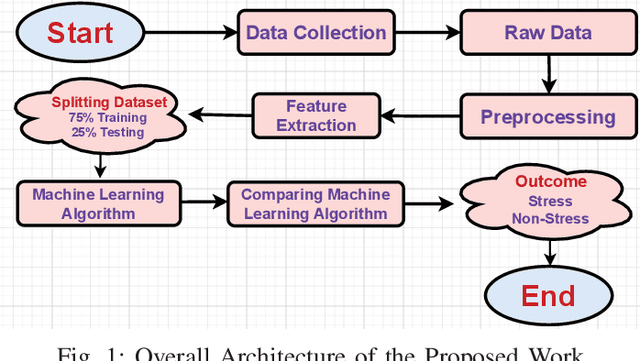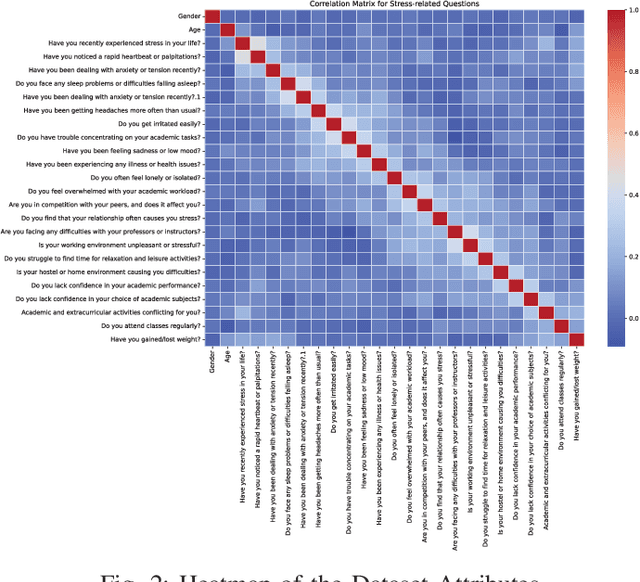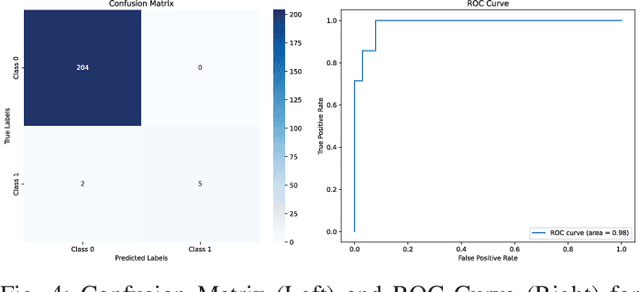Abhishek Shrivastava
Machine Learning Algorithms for Detecting Mental Stress in College Students
Dec 10, 2024



Abstract:In today's world, stress is a big problem that affects people's health and happiness. More and more people are feeling stressed out, which can lead to lots of health issues like breathing problems, feeling overwhelmed, heart attack, diabetes, etc. This work endeavors to forecast stress and non-stress occurrences among college students by applying various machine learning algorithms: Decision Trees, Random Forest, Support Vector Machines, AdaBoost, Naive Bayes, Logistic Regression, and K-nearest Neighbors. The primary objective of this work is to leverage a research study to predict and mitigate stress and non-stress based on the collected questionnaire dataset. We conducted a workshop with the primary goal of studying the stress levels found among the students. This workshop was attended by Approximately 843 students aged between 18 to 21 years old. A questionnaire was given to the students validated under the guidance of the experts from the All India Institute of Medical Sciences (AIIMS) Raipur, Chhattisgarh, India, on which our dataset is based. The survey consists of 28 questions, aiming to comprehensively understand the multidimensional aspects of stress, including emotional well-being, physical health, academic performance, relationships, and leisure. This work finds that Support Vector Machines have a maximum accuracy for Stress, reaching 95\%. The study contributes to a deeper understanding of stress determinants. It aims to improve college student's overall quality of life and academic success, addressing the multifaceted nature of stress.
* This paper was presented at an IEEE conference and is 5 pages long with 5 figures. It discusses machine learning algorithms for detecting mental stress in college students
AI-Based Automated Speech Therapy Tools for persons with Speech Sound Disorders: A Systematic Literature Review
Apr 21, 2022



Abstract:This paper presents a systematic literature review of published studies on AI-based automated speech therapy tools for persons with speech sound disorders (SSD). The COVID-19 pandemic has initiated the requirement for automated speech therapy tools for persons with SSD making speech therapy accessible and affordable. However, there are no guidelines for designing such automated tools and their required degree of automation compared to human experts. In this systematic review, we followed the PRISMA framework to address four research questions: 1) what types of SSD do AI-based automated speech therapy tools address, 2) what is the level of autonomy achieved by such tools, 3) what are the different modes of intervention, and 4) how effective are such tools in comparison with human experts. An extensive search was conducted on digital libraries to find research papers relevant to our study from 2007 to 2022. The results show that AI-based automated speech therapy tools for persons with SSD are increasingly gaining attention among researchers. Articulation disorders were the most frequently addressed SSD based on the reviewed papers. Further, our analysis shows that most researchers proposed fully automated tools without considering the role of other stakeholders. Our review indicates that mobile-based and gamified applications were the most frequent mode of intervention. The results further show that only a few studies compared the effectiveness of such tools compared to expert Speech-Language Pathologists (SLP). Our paper presents the state-of-the-art in the field, contributes significant insights based on the research questions, and provides suggestions for future research directions.
 Add to Chrome
Add to Chrome Add to Firefox
Add to Firefox Add to Edge
Add to Edge